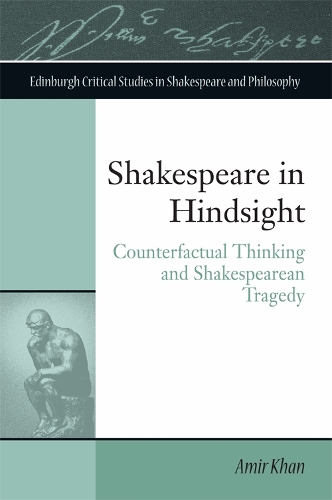
Shakespeare in Hindsight: Counterfactual Thinking and Shakespearean Tragedy
(Paperback)
Publishing Details
Shakespeare in Hindsight: Counterfactual Thinking and Shakespearean Tragedy
By (Author) Amir Khan
Edinburgh University Press
Edinburgh University Press
8th November 2017
United Kingdom
Classifications
Tertiary Education
Non Fiction
Literary studies: plays and playwrights
Literary studies: c 1600 to c 1800
Literary theory
822.33
Physical Properties
Paperback
248
Width 156mm, Height 234mm
301g
Description
We know William Shakespeare matters but we cannot pinpoint, precisely, why he matters. Lacking reasons why, we do our best to involve him in others, or involve others in him. He has been branded many times over-as Catholic, Protestant, Materialist, Marxist, Psychoanalytic, Feminist, Postcolonial, Popular, Cultural, and, even, Popular-Cultural. In many ways, Shakespeare is overwrought. Why one more 'approach' to Shakespeare One reason is because whatever these approaches say about tragedy in particular, none of them help us to feel tragedy. Or, rather, they subordinate tragedy to something else-to considerations of, say, class, race, or gender. What these approaches manage to do is explain tragedy away. What this book does is to help us feel tragedy first and foremost-hence to perceive it better. The aim of Amir Khan's counterfactual criticism of Shakespeare's tragedies, Hamlet, King Lear, Macbeth, A Winter's Tale and Othello, then, is precisely to reanimate the tragic effect, long since lost in some deluge of explanation.
Reviews
A splendidly original investigation of Shakespeares most beloved tragedies. I applaud Khan for his courage and ambition in offering the reader a way of experiencing these familiar plays as if for the first time by re-examining the basic premises of character and action. For readers of his book, Hamlet, Macbeth, Lear, and Othello will never be the same. -- Gail Kern Paster * Folger Shakespeare Library *
Author Bio
Amir Khan is Xinghai Associate Professor of English in the School of Foreign Languages at Dalian Maritime University. His books include Comedies of Nihilism (2017) and Shakespeare in Hindsight (2016). He is managing editor of Conversations: The Journal of Cavellian Studies. He lives and works in China.
